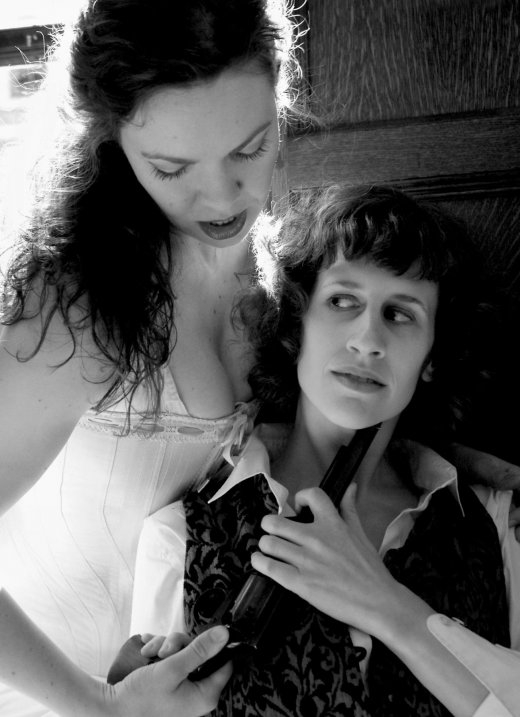
1. Hedda Gabler, Femme Fatale and Conflicted Mistress
Hedda Gabler is the portrait of a woman suffocating from boredom and dissatisfaction, not to mention struggling with feelings for other women. Her marriage, even in its post honeymoon stages, is a nattily dressed drag going quickly lackluster. Her husband, George Tesman, is clueless and insufferably gay (in the antiquated sense of the word) such that Hedda seeks out ways to avoid his company—since, well, she prefers the company of women. In fact, Hedda’s attraction to women—Eilert Lovborg in particular, a women who dresses in men’s clothes and lives life with abandon—seems to be the only outlet through which she can fantasize about a life free from the pressures of her social and marital existences. If only she were strong enough to accept her own freedom. But alas, she is not. Instead, clothed in apathy woven with cowardice, she seeks to draw everyone around her into the same misery and purposelessness she experiences day in and day out. What’s so bemusing, however, about the Hedda Gabler, is that she is utterly contemptible as well as utterly pathetic. While her circumstances are purportedly intolerable, her manner of resolving them is reprehensible. In some sense, the audience is left to ponder what to do with Hedda, as Hedda ponders what to do with herself.
2.The Ostentatious Yet Foreboding Set Design
Haughty, purpled-earth crown-moldings, a nicked and marred baby grand piano that retains a certain regal quality and a plush rose fainting couch with it’s vanished oak brothers and sisters caparison the single-set play of Hedda Gabler. Of course, it’s all hardly for show: these opulent lodgings merely posit a societal height that collapses into bedlam and wretchedness in the final scene. Even the most joyous of occasions depicted in the play are smothered in the somber drapery of Hedda’s dreary villa.
3.The Beautifully Subtle Satire of Propriety and Formality
Imagine if the “all smiles” mentality that pervades modern corporate America were caked on the faces and expressions of every ostensibly “respectable” person you knew? Ah, too late! Present day American has it bad enough, to be sure, but taking from the sterile protocols that forestalled all heartfelt expression in the mid 19th century—well, all I can say is, thank god for the hippie movement. At first glance, one might assume the actors’ over-the-top and the gushy dramaturgy of persons from the period as simply bad acting; which is, sadly, somewhat typical of period piece theatrical depictions. As the plot unfolds, however, it becomes clear that the relentless onslaughts of social ritual are actually protracted polemics censuring the “all smiles” way of life.
4.The Swell One-Liners
‘Cause every play’s got them (hopefully)—and filtered through the formalistic speak of Hedda Gabler, you’ve got yourself some (ahem) real zingers. Here are but a few of those witty gems: “Brainy women are very much in vogue these days.” “Oh we’ll just have a cozy time together, won’t we?” “Dear, you shouldn’t be speaking of such somber topics.” And so on and so forth. Sometimes, all the pomp and circumstance can become monotonous (even for a lover of Victorian Prose, such as myself), but there’s never a shortage of scandal to keep things interesting. Still, I cannot imagine anyone being ever so profoundly elated that it has brought him to remark, “How Delightful!” or, “Splendid!” or “Capital!” all the damn time. Point blank: soak up all that old-timey talk goodness while you can.
5.The Final Scene
After trekking through what could be seen as a relatively uneventful drama, things eventually get ugly, and even uglier realizations come to light when the principals get together in the final scene. The unalloyed look of terror washed across Hedda’s face is epic and fear provoking, as she receives harbingers of further boredom, dissatisfaction and unfulfilled desires that will plague her for the rest of her days—until death does her part, that is. It is not, however, the doing of a tragic flaw of Hedda’s that precipitates this baleful conclusion; it is the maelstrom of human emotions gone unchecked, such that it devours one in its tumult. Such is the case of Hedda Gabler: her concession to live a miserable life brought on from a fear of her true desires being fulfilled, thus making her the architect of her own demise. — AARON STELLA
Mauckingbird Theatre Company presents the Philadelphia Premiere of Hedda Gabler
By Henrik Ibsen
a new adaptation by Caroline Kava directed by Peter Reynolds
January 10 – 29, 2009 – Opening Night, Tuesday, January 13 at 7:30 p.m.
Adrienne Theatre, Second Stage, 2030 Sansom Street, Philadelphia, PA 19103
Tickets: Adults – $20, Senior Citizens – $18, Students – $15
Box Office: (215) 923-8909, www.mauckingbirdtheatreco.org
